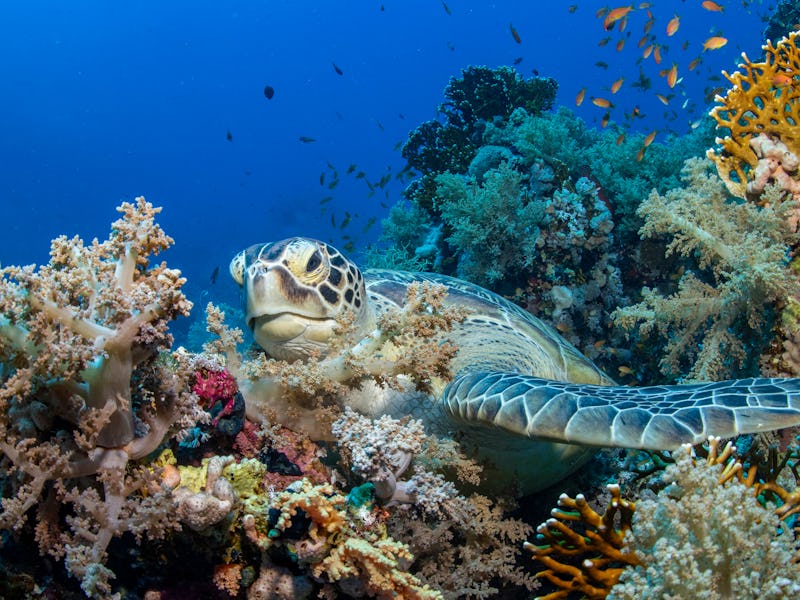A sea turtle superpower may be the reason they're dying
Sea turtles' keen sense of smell may be putting them at risk.

Sea turtles are the poster animal for plastics pollution in the ocean.
There is a reason why they may be so susceptible to becoming caught up in plastic trash.
In a new sea turtle behavior study, researchers show that sea turtles' odor-detecting skills might be putting them at greater risk from plastic pollution than other sea creatures.
It turns out that certain plastics known as "biofouled plastics" release a smell that tempts turtles, endangering their health. Biofouled plastics are those that have accumulated populations of microorganisms and small animals like barnacles over the course of several weeks in the ocean.
The results come from experiments in 15 loggerhead sea turtles. Scientists deployed four odors through a tube: deionized water, turtle food, clean plastic, and biofouled plastic. They then recorded the turtles' responses, specifically looking at whether and how often they put their noses up above the water's surface, a behavior associated with feeding.
The turtles kept their noses out of the water three times longer for the food and biofouled plastic than they did for the other odors. The results suggest the turtles might mistake the plastic for their favorite foods.
The study was published on Monday in the journal Current Biology.
The results were unexpected, according to the researchers, led by Joseph Pfaller, a biologist at the University of Florida.
"We were surprised that turtles responded to odors from biofouled plastic with the same intensity as their food," Pfaller said in a statement.
"We expected them to respond to both to a greater extent than the control treatments, but the turtles know the smell of their food since they've been smelling and eating it in captivity for 5 months. I expected their responses to food to be stronger."
The experiment involved 5-month-old sea turtles, placed in a tank where they were piped different odors to see how they reacted.
Sea turtles have a particularly good sense of smell, which comes in handy when they're foraging for food in murky water. Smelling skills also help female sea turtles return to their home beaches to lay their eggs, a process called natal homing.
Sea turtles' smelling abilities involve taking in a big gulp of sea water. As a 2009 study describes, sea turtles open their nostrils and "engage in a rhythmic ‘throat-pumping,’" which scientists think floods their nasal cavities and allows water to wash over the internal organs that help them smell.
In the ocean, plastic mimics food
In addition to the plastics’ smell, the look of plastic particles can also cause problems for marine life — including being confused for food.
When plastic is confused for food, sea turtles can ingest it. Plastic particles become "olfactory traps," the researchers say, with potentially grave consequences. The deceptive plastic can alter how turtles forage, and potentially prove fatal.
"Whether through ingestion or entanglement, foraging strategies that increase the frequency of interactions with marine plastic debris threaten both wildlife and their role in the ecosystem," the authors write.
The turtles aren't the only oceanic creatures being cruelly deceived by human trash.
A study published in November 2019 showed that baby fish tend to accidentally “prey” on tiny shreds of plastic of roughly the shape and size of the plankton they rely on for nourishment.
Since fish larvae and plastic both float along the water’s surface, the opportunities for confusion are plentiful, as Inverse reported at the time the study was published.
And if plastic-eating starts early in life, then the particles have higher chances of accumulating across the food chain — meaning this plastic eventually ends up on your (human) plate.
Better understanding of exactly how and why plastics pose risks to sea creatures can help design better conservation programs to protect them, the researchers on the new study say. These strategies could also help protect us from ingesting these dangerous shreds of waste, too.